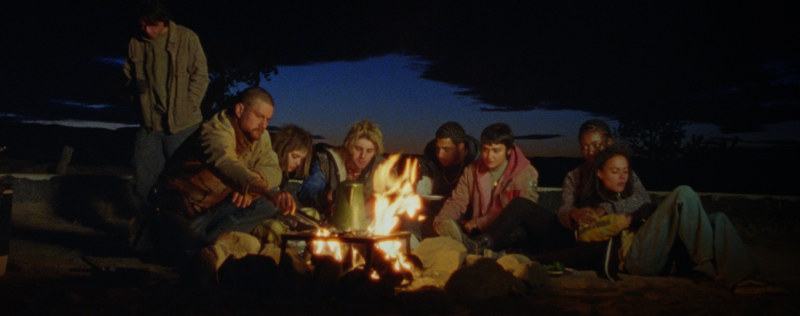
What end justifies the means? If the end is radical environmental change and the survival of our planet, can violence be justified? In actions against private property, what if life is lost? How To Blow Up a Pipeline, the new eco-political film from Neon, directed and co-written by Daniel Goldhaber (whose last film was the wonderfully surreal Cam, 2018), begins with a hissing sound. The tires of a gas-guzzling SUV have been punctured. A flyer placed on the windshield reads: “Why was your property vandalized?” This mild act will seem quaint as the thrilling Pipeline spirals into scorched-earth activism. You are left sated and exhausted, with the bonus feeling that may spur you to action (beyond clicking ‘likes’) to mitigate our collective future.
Inspired by Swedish author Andreas Malm’s 2018 book, How To Blow Up a Pipeline, advocates for a movement that disavows pacificism to be replaced with targeted violent acts of disruption (that only destroy property). This manifesto sparks heated debates amongst the movie’s characters. Given its ferocious and rapid narrative, we experience these scenes of conflict as integral plot development instead of polemic screeds—a neat trick.
The film’s tight script structure; cinematographer Tehillah de Castro’s gritty, at times pastoral landscapes (especially in scenes shot in 16mm in New Mexico and North Dakota, enhancing a verité feeling); and Daniel Garber’s precise editing immerses the viewer in a world not often seen in commercial films. But its nearly cliffhanging ninety minutes rivals many a big-budget, special-effects-heavy Mission Impossible and heist (think Ocean’s Eleven) movie.

Parallel to the more conventional Hollywood productions, we see how a crew of diverse talents is recruited; how weapons are assembled and weaponized; and, of course, the interpersonal drama of the movie’s multiple protagonists. Director Goldhaber achieves this with an economy of scale while eliciting natural performances from an ensemble of future stars. Standouts include Ariela Barer (a co-writer/producer on the film) as Xochitl, who emerges as a leader within the group, and Sasha Lane (a standout in American Honey), whose tragic backstory as Theo inspires everyone as they struggle with life or death decisions. The one well-known exception to this cast of new faces is the current heartthrob and ubiquitous Lukas Gage of White Lotus, Euphoria, You fame, who delivers a suspenseful and outrageous sex scene that comes across as both plausible and comedic.
As it barrels toward its climax (a good pun once you see the film), How To Blow Up a Pipeline will course through your nerves as the inevitable countdown clock hits zero. Each character’s passions and sacrifices, portrayed in effective flashbacks, will stay with you long after the credit roll.

Leaving the theater, my emotions were stirred to the point where I desperately wanted to see results. A tangible victory in the fight for our future — as in big-budget movies where some impossible solution or happy ending sends the audience into the fantasy of closure. Of course, the problems facing our lives on this Earth will not be corrected with anything resembling a feel-good Hollywood ending. This more real-than-fiction thriller points the way forward with a proposed idea for action and reminds us that our global countdown clock will maim us all if no action is taken. How To Blow Up a Pipeline is a clarion call. It is highly recommended.
